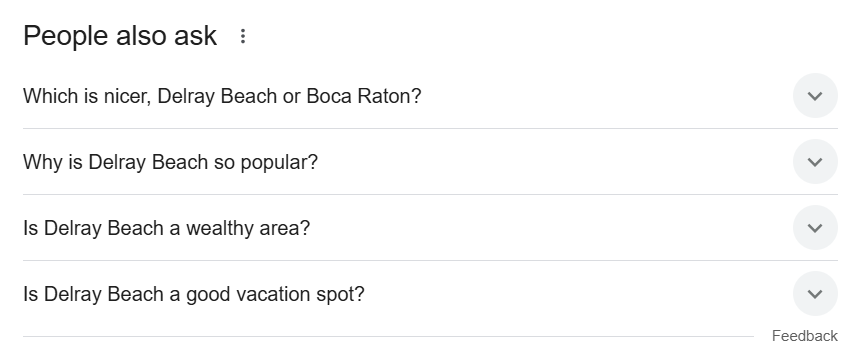
Master Your Online Visibility: The Power of Search Results Analysis
As a digital marketing veteran with over a decade in the travel industry, I’ve transformed countless resorts’ online visibility. Today, I’m pulling back the curtain on a real-world search results analysis – using “resort in Delray Beach” as our case study – and showing you how to weaponize these insights for any destination.
The battle for visibility in competitive resort markets is fierce. But with the right strategy, your property can rise above online travel agencies (OTAs) and competitors alike.
Let’s dive into what’s really happening in those search results and how these principles apply across destinations.
What Google’s First Page Tells Us About the Resort Landscape
Breaking Down the Search Results Page
The search results page is your first glimpse into traveler intentions and competitive positioning:

Map Results Dominance
That map at the top? It’s prime real estate. You must have a Google Business Profile and optimize it as much as possible. Fill in anything that is relevant to your resort. Don’t underestimate the value of the business categories and attributes, they are your differentiators.
Competitive Content Mix
The organic results reveal a strategic battleground between individual resort websites and online travel agencies. Properties like Opal Grand and The Seagate are successfully competing against giants like Booking.com and TripAdvisor. Doesn’t hurt that Google knows a user will want to see a mix of results, which comes to the next callout.
Content That Converts
Top results showcase clear patterns: branded pages highlighting unique amenities, list-based content that satisfies comparison shoppers, and location-focused messaging that speaks to destination seekers.
The Not So Hidden Gems
The query refinement options within the Search Engine Results Page (SERP) provide valuable insights into understanding traveler intent as well as helpful information that users may be seeking. The refinements and the People also ask sections are provided to maintain user engagement and Google has the data to know what is important to searchers. If Google is showing them, you know that content around those topics is important, but we will get to that later.


Content Types are Important
The only content that is displayed are map/location results and website content. It is important to note that Images, Videos, and other content types are absent from these results. This doesn’t mean that other related search queries won’t show more images or videos but for this search phrase those assets aren’t a priority.
Winning Strategies from Top-Ranking Delray Beach Resorts
What separates the winners from the competition? Let’s analyze three properties that have cracked the Google code. I will caveat this with an important notation, these are well established resorts, and they have built their authority over time. It will be challenging for a new resort to outrank them.
The Seagate’s Luxury Differentiation Strategy
The Seagate doesn’t just promote rooms, they’re selling an elevated experience:
Exclusive Access as a Selling Point
Their content emphasizes private beach club and golf club access; amenities competitors can’t match.
Strategic Location Positioning
They’ve mastered the balance between highlighting beach proximity and walkability to Atlantic Avenue’s entertainment.
Premium Experience Emphasis
Every content touchpoint reinforces their luxury positioning with sophisticated language around “elevated” experiences.
Opal Grand’s Oceanfront Advantage
Opal Grand shows the power of leaning into a natural competitive advantage:
Beachfront Repetition Strategy
“Oceanfront” appears multiple times in titles and descriptions, a clear positioning strategy.
Renovation Messaging
Their “completely reimagined” property narrative attracts travelers who prioritize updated accommodations.
Luxury Service Highlighting
Consistent emphasis on “spa,” “dining experiences,” and “luxury accommodations” throughout their content.
The Ray Hotel’s Urban Resort Approach
The Ray demonstrates a completely different but equally effective strategy:
Arts District Positioning
Their Pineapple Grove Arts District location targets culture-seeking travelers looking for a different resort experience.
Contemporary Design Focus
Language about “contemporary,” “swish” and “urban pad” speaks directly to style-conscious travelers.
Amenity Variety Emphasis
Their content strategically highlights their multiple eateries, wellness facilities, and rooftop spaces.
Inside the Traveler’s Mind: Decoding Search Intent
The SERP reveals distinct search intentions that your SEO strategy must address:
The Comparison Shopper
List-based results from TripAdvisor and OTAs perform well because many searchers are actively comparing options.
Location-Specific Seekers
Clear signals show users care about specific areas within Delray Beach, downtown vs. oceanfront isn’t just a detail, it’s a decision driver.
Amenity Hunters
Beach access, pools, and proximity to attractions appear repeatedly in top results, evidence that these features drive booking decisions.
Ready-to-Book Travelers
The strong presence of booking CTAs indicates many searchers have commercial intent and are approaching decision time.
Beyond “Hotel in Delray Beach”: Capturing the Full Travel Journey
Smart hotels don’t just optimize for the obvious, they intercept travelers earlier in their decision process.
The Destination Selection Phase
Before searching for Delray Beach hotels, travelers compare destinations. They’re asking: “Delray Beach or Boca Raton?” and “Best South Florida beach towns.”
The Experience Research Phase
Early-stage searchers seek specific experiences: “walkable downtown Florida vacation” or “best beaches in South Florida.”
The Practical Planning Phase
Logistics-focused searches like “how to get to Delray Beach” or “best time to visit Delray Beach” represent opportunities to capture attention before competitors.

Local SEO: The Make-or-Break Factor for Delray Beach Hotels
The local pack results reveal critical success factors:
Review Power
Top-performing hotels maintain robust review profiles with consistent recent positive feedback.
Location Advantage
Properties Google considers “central” to downtown Delray Beach receive a ranking boost, a factor that must be addressed in your Google Business Profile. This is somewhat unique compared to most destinations, because Delray Beach is a large city that extends 16 square miles inland. Google understands that “resort” and most “hotel” searchers are predominantly interested in being close to the downtown and near the ocean.
Category Specificity
Generic “hotel” categorization underperforms against more specific classifications in Google Business Profiles.
Profile Completeness
Every amenity field, photo opportunity, and hours update matters for local pack performance.
Content Gaps: Untapped Opportunities in Delray Beach
The SERP reveals several content opportunities most hotels are missing:
Neighborhood-Specific Content
Few properties target searches for specific Delray Beach neighborhoods or areas, a wide-open opportunity.
Seasonal Targeting
Limited content addresses seasonal visitors with specific needs and interests.
Event Connections
Few hotels create content linking their property to local events, festivals, and attractions, missing a major booking driver.
Destination Comparisons
Almost no hotels directly compare Delray Beach to nearby alternatives like Boca Raton, a strategic upper-funnel opportunity.

Your Roadmap to SEO Dominance in Delray Beach
Based on this SERP analysis, here’s your strategic action plan:
1. Local SEO Power Moves
Google Business Profile Mastery
Ensure 100% profile completion with all hotel-specific attributes, fresh weekly photo updates, and location-specific descriptions.
Review Generation Engine
Implement automated post-stay review requests focusing specifically on aspects of the local Delray Beach experience.
Citation Consistency Campaign
Audit and correct NAP (Name, Address, Phone) information across all travel directories, consistency here directly impacts rankings.
2. High-Intent Landing Page Optimization
Location-Specific Pages
Create dedicated pages for key variations like “oceanfront hotel in Delray Beach” and “downtown Delray Beach hotel.” Be careful to ensure this content is helpful and not designed just with SEO in mind.
Amenity Showcase Pages
Develop feature-specific landing pages for high-search amenities like beach access and pool facilities.
Mobile Experience Enhancement
Optimize page speed and user experience specifically for mobile hotel searchers, who now represent over 70% of travel researchers.
3. Upper-Funnel Content Capture Strategy
Destination Comparison Content
Create authoritative guides like “Delray Beach vs. Boca Raton: Choosing Your Perfect South Florida Vacation.”
Interest-Based Content Hubs
Develop themed content clusters around:
- The Foodie’s Guide to Delray Beach
- Arts & Culture Experiences in Delray Beach
- Outdoor Adventures Beyond the Beach
- Shopping Destinations in Delray Beach
Seasonal and Special Interest Guides
Target specific traveler segments with content like:
- “Winter Escape: Why Delray Beach is the Perfect Snowbird Destination”
- “Multi-Generation Family Trips to Delray Beach: Planning Guide”
- “Romantic Weekend Getaways in South Florida: The Delray Beach Experience”
Immersive Local Storytelling
Bring the destination to life with content like:
- “A Perfect Day in Delray Beach: Dawn to Dusk Itinerary”
- “Local Secrets: Hidden Gems Only Delray Residents Know About”

Strategic Implementation Notes:
- Content Maintenance: Schedule monthly reviews of existing content performance to identify opportunities for updates
- Foundational Tasks First: Begin with Google Business Profile optimization and high-intent landing pages to establish strong SEO fundamentals
- Progressive Content Depth: Move from conversion-focused content to broader upper-funnel content as the campaign progresses
- Seasonal Alignment: Adjust timeline to ensure seasonal content is published 2-3 months before target travel season
4. Competitive Differentiation Amplification
USP Clarity Campaign
Identify and prominently feature unique selling propositions underrepresented in competitor messaging.
Amenity Gap Exploitation
Highlight the amenities you offer that competitive properties don’t, or that they’re failing to emphasize.
Location Advantage Visualization
Create content that clearly articulates your location advantages relative to key attractions and areas.
The Bottom Line: SERP Insights = Booking Success
This analysis of the “hotel in Delray Beach” search results reveals clear opportunities for properties willing to invest in strategic SEO:
Location Messaging Matters
The SERP proves that clear oceanfront or downtown positioning dramatically influences ranking potential.
Amenity Differentiation Wins
Hotels with clearly communicated unique features stand out in the crowded results.
Local SEO is Non-Negotiable
That prominent map pack means Google Business Profile optimization deserves equal priority with website SEO.
Content Gaps = Opportunity
Significant content opportunities exist around neighborhoods, seasons, and destination comparisons.
Early Journey Capture = Competitive Edge
The most sophisticated strategy extends beyond “hotel in Delray Beach” to capture travelers during destination selection.
By systematically applying these insights, your Delray Beach hotel can develop an SEO strategy that dramatically improves visibility and drives more profitable direct bookings.
Ready to transform your hotel’s digital presence? This SERP-based strategy provides your roadmap to success.
I’m an SEO and performance marketing leader who loves breaking down complex strategies into clear, actionable insights. I have driven growth for reputable brands such as SAP, Four Seasons, BioMarin Pharmaceutical, and Rosewood Hotels in SEO and Performance Marketing strategy.

